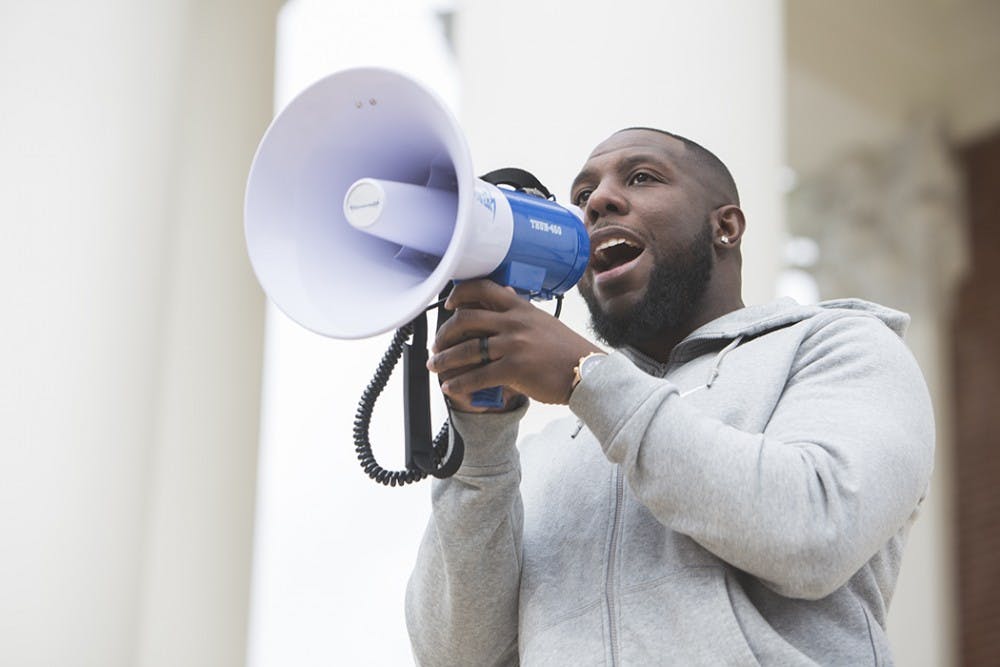The special prosecutor in the court case considering whether Charlottesville’s Vice Mayor Wes Bellamy should be removed from office has determined that the petition filed against Bellamy did not receive enough signatures for it to be considered by the court. As a result, a Charlottesville Circuit Court judge dismissed the petition on March 8.
Local blogger Jason Kessler — whom some community members allege is associated with the white nationalist “alt-right” movement — filed the petition to remove Bellamy Feb. 16 as a result of dozens of Bellamy’s old tweets Kessler uncovered last fall. An investigation by The Cavalier Daily also found numerous tweets containing lewd language and profanity.
In the petition, Kessler said these tweets were offensive to various groups of people.
“In November of 2016, it was discovered that Mr. Bellamy previously produced a litany of hateful and discriminatory messages attacking caucasians, women, homosexuals and African-Americans on Twitter,” Kessler wrote in his petition. “These statements went so far as to promote messages reasonably construed to condone and promote actions that would constitute sexual assault or rape.”
In the petition, Kessler alleged Bellamy had misused his office by having an official Twitter account and associating his comments with his position as a member of the Charlottesville City Council.
“This misuse of office has had a material adverse impact on [the] City by creating a significant number of negative reports and harming the City’s reputation,” Kessler wrote.
According to state code, the petition had to gather 10 percent of the number of votes cast at the election in which Bellamy was voted into office. However, there was debate over whether the amount of votes referred to the total cast in the overall election or the total cast only for Bellamy. Lynchburg Commonwealth’s Attorney Michael Doucette, who was appointed as the special prosecutor for the case, interpreted the state code using the former definition after consulting with other attorneys.
Because 15,798 votes were cast in the 2015 City Council election, the petition needed to obtain 1,580 signatures to be considered by the court. It fell short by about 1,000 signatures.
Doucette filed the motion to non-suit, or not move forward with the petition, on March 7.
“By filing a non-suit, what I was saying was, ‘this case isn’t ready for primetime,’” Doucette said in an interview with The Cavalier Daily.
Kessler, however, said there is no precedent indicating how many signatures are necessary to remove Bellamy from office.
“Doucette admitted this to me behind closed doors,” Kessler said in an email to The Cavalier Daily. “So the fact that he later agreed with Bellamy's attorney on the signature total showed that he had no intention of giving it a fair hearing.”
In his motion, Doucette said the Commonwealth would argue the deficient number of signatures was reason enough for a non-suit, but listed two other reasons not to move forward.
“First, the evidence that the Commonwealth has at this time is that the social media conduct of Mr. Bellamy that is complained about in the petition is believed to have occurred between 2009 and 2014,” Doucette wrote in the motion. “But the law is the ‘misconduct establishing a basis for removal must have occurred during the officer’s present term’ … Mr. Bellamy’s present term of office began in January 2016.”
Second, Doucette wrote, the petition fails to explain how Bellamy’s offensive tweets affect his work as a council member.
“There must be an allegation of a direct link between the misconduct and the inability to properly carry out the duties of that office,” Doucette wrote. “At this time, the removal petition inadequately explains that link.”
Kessler said he believes Doucette “disenfranchised” signatories by not moving forward with the petition.
“I was dismayed that he didn't even do me or the other petitioners the courtesy of a phone call or email during the process,” Kessler said. “He reviewed none of our evidence, and we learned about the court date for non-suit through the media like everyone else.”
Kessler is the founder of the conservative political advocacy group Unity and Security for America, which describes itself on its website as “dedicated to defending Western Civilization including its history, culture and peoples while utterly dismantling Cultural Marxism.” He and his organization have been a point of controversy in the case, facing accusations of racism and xenophobia.
The website features “alt-right” symbol Pepe the Frog — a meme which has come to be associated with racism and anti-Semitism. Kessler, however, has previously claimed Unity and Security for America is “not an alt-right organization.”
Per the motion to non-suit, Kessler, or anyone else, can file a new petition. The petition still must obtain at least 1,580 signatures.
Doucette said he does not know if Kessler will draft a new petition, but he said the petition needs to provide more facts as to how Bellamy’s tweets impacted his performance as a council member.
“The petition [he] filed is pretty vague,” Doucette said. “I did talk to Mr. Kessler afterwards and explained to him that if he is going to refile, he’s going to have to come up with specific facts. The more facts you have, obviously the better.”
Bellamy and his attorney Pam Starsia did not return a request for comment.







